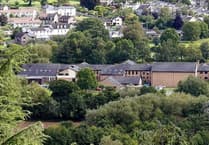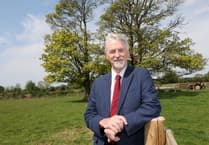AS the controvery over the Welsh Governent’s purchase of Gilesstone Farm in Talybont-on-Usk rumbles on, the Usk Valley Conservation Group (UVCG) has published a series of questions asking exactly what the Government knew about the farm, prior to its sale.
Having previously spoken about the ‘mysteries and growing local concerns,’ UVCG co-chairman Peter Seaman has issues a series of questions on behalf of the group, which aim to discover how well informed Mark Drakeford and his ministers were before signing off on the £4.2million deal.
Phil Darbyshire co-chair of UVCG said “The community fully supports sustainable tourism and other sustainable developments, but sustainable means any proposals must not be environmentally damaging and be acceptable to the host community.
“Unless the Welsh Government can provide satisfactory answers to these and other questions, it will continue to look like its engaged in high-handed covert operations that lack both propriety and common sense. Like the flood water across the farm, this gets murkier and murkier”
The Usk Valley Conservation Group was formed following a public meeting held in Talybont-on-Usk in May this year, following the announcement in the National media of the purchase of the farm by the Welsh Government.
The questions UVCG want answered
Did the Government know that that most of the farm is regularly inundated with flood waters?
Gilestone Farm is identified by Natural Resources Wales (NRW) as being at risk of flooding at least one in every 30 years.
ut local people know that some 85% of the farm is inundated with floodwater every four years on average – a figure based on NRWs own published river flow data. Lesser but still serious floods occur pretty much every year and the impacts of climate change will be expected to increase the frequency and severity of flooding in coming years.
Did the Welsh Government know that the farm is an internationally important area for wildlife?
The farm and its adjacent river support a rich and biodiverse ecosystem that will be at risk from an increase in human activity.
The farm is a vital foraging area for the highly protected lesser horseshoe bat. The Vincent Wildlife Trust manages the five bat roosts and nursery sites in this bat hotspot.
This part of the Usk valley is a European stronghold for this threatened species. Surveys have demonstrated that Gilestone farm is an essential foraging area for this bat and is of upmost importance to their survival.
This bat species in particular will avoid light and noise.
Any use of the farmland which leads to an increase in light and noise intrusion will negatively impact the bat population.
Lesser Horseshoe bats are protected in the UK under the Wildlife and Countryside Act, 1981, a priority Species under the UK Post-2010 Biodiversity Framework and a European Protected Species under Annex IV of the European Habitats Directive.
Did the Welsh Government consider its own curlew recovery project before purchasing the farm?
In the Winter 2021, the area was declared by Gylfinir Cymru (‘Curlew Wales’) as part of the southern most Important Curlew Area in Wales to aid nationwide recovery of this bird from extinction in the UK.
The land is considered suitable for curlew recovery action with a small number of sites, although not on the farm, still in use in the immediate area. An area to the western end of the farm had been identified as a potential nesting site by local ‘Curlew Wales’ staff but that potential project was ended with the purchase of the farm.
What environmental studies or assessments did the Welsh Government carry out prior to the purchase?
In a Freedom of Information Act request, the Welsh Government said “Standard Environmental reports were commissioned prior to the purchase and further reports would be carried out for any future use of the property as appropriate” Did these assessments include flood risk and wildlife?
Why did the Welsh Government try to keep the purchase a secret from the local community?
Maybe it thought its plans for mass tourism events to be staged in the heart of the community would not be welcome? If it had asked it would also have learned a lot about the farm’s special environmental and wildlife features and established a dialogue before purchase.
Why did the Welsh Government or NRW, its own advisor on the environment and wildlife, not consult with the Brecon Beacons National Park Authority prior to the purchase of the farm? The wildlife features of the farm may then have been disclosed.
Was the Welsh Government aware of the sporting rights owned by a third party before the purchase of the farm?
UVCG is aware that the sporting rights are owned by a third party which was not consulted or made aware by the Welsh Government of the intended purchase of the farm. The non-inclusion of the sporting rights was made clear in estate agency McCartneys prospectus of the farm.
Has the Welsh Government bought a ‘pig in a poke’?
It is the view of the UVCG that the Welsh Government cannot have conducted appropriate due diligence regarding the future use of the farm prior to its purchase





Comments
This article has no comments yet. Be the first to leave a comment.